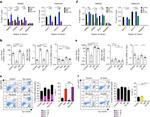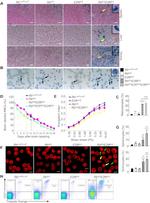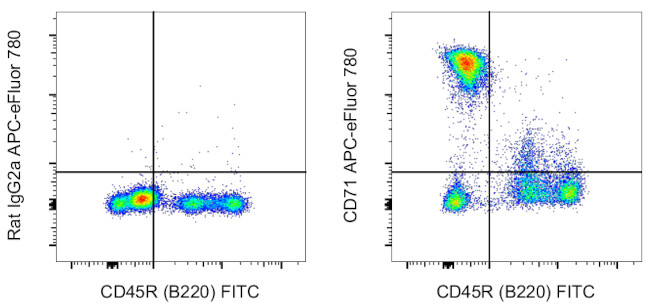Search Thermo Fisher Scientific
Invitrogen
CD71 (Transferrin Receptor) Monoclonal Antibody (R17217 (RI7 217.1.4)), APC-eFluor™ 780, eBioscience™
FIGURE: 1 / 10
CD71 (Transferrin Receptor) Antibody (47-0711-82) in Flow










Product Details
47-0711-82
Species Reactivity
Published species
Host/Isotype
Recommended Isotype Control
Class
Type
Clone
Conjugate
Excitation/Emission Max
Form
Concentration
Purification
Storage buffer
Contains
Storage conditions
Shipping conditions
RRID
Product Specific Information
Description: The R17217 monoclonal antibody reacts with mouse CD71, a 170-180 kDa type II transmembrane protein. CD71, the transferrin receptor, exists as a homodimer on the cell surface and is essential for cellular growth. CD71 is expressed by immature proliferating cells and at low levels on resting mature lymphocytes. Antigen or mitogen stimulation of T and B cells upregulates the expression of CD71. Expression level differences have been observed in different mouse strains.
Applications Reported: This R17217 (RI7 217.1.4) antibody has been reported for use in flow cytometric analysis.
Applications Tested: This R17217 (RI7 217.1.4) antibody has been tested by flow cytometric analysis of mouse bone marrow cells. This may be used at less than or equal to 0.25 µg per test. A test is defined as the amount (µg) of antibody that will stain a cell sample in a final volume of 100 µL. Cell number should be determined empirically but can range from 10^5 to 10^8 cells/test. It is recommended that the antibody be carefully titrated for optimal performance in the assay of interest.
APC-eFluor 780 emits at 780 nm and is excited with the Red laser (633-647 nm). Please make sure that your instrument is capable of detecting this fluorochrome.
Light sensitivity: This tandem dye is sensitive to photo-induced oxidation. Please protect this vial and stained samples from light.
Fixation: Samples can be stored in IC Fixation Buffer (Product # 00-8222-49) (100 µL of cell sample + 100 µL of IC Fixation Buffer) or 1-step Fix/Lyse Solution (Product # 00-5333-57) for up to 3 days in the dark at 4°C with minimal impact on brightness and FRET efficiency/compensation. Some generalizations regarding fluorophore performance after fixation can be made, but clone specific performance should be determined empirically.
Excitation: 633-647 nm; Emission: 780 nm; Laser: Red Laser
Target Information
Cellular uptake of iron occurs via receptor-mediated endocytosis of ligand-occupied transferrin receptor into specialized endosomes. Endosomal acidification leads to iron release. The apotransferrin-receptor complex is then recycled to the cell surface with a return to neutral pH and the concomitant loss of affinity of apotransferrin for its receptor. Transferrin receptor is necessary for development of erythrocytes and the nervous system. Serum transferrin receptor (sTfR) is used as a means of detecting erythropoietin (EPO) misuse by athletes and as a diagnostic test for anemias resulting from a number of conditions including rheumatoid arthritis, pregnancy, irritable bowel syndrome and in HIV patients.
For Research Use Only. Not for use in diagnostic procedures. Not for resale without express authorization.
Bioinformatics
Protein Aliases: CD antigen CD71; CD71; mammary tumor virus receptor 1; TR; Transferrin receptor protein 1
Gene Aliases: 2610028K12Rik; AI195355; AI426448; AU015758; CD71; E430033M20Rik; Mtvr-1; Mtvr1; p90; TFR; TFR1; Tfrc; TR; Trfr
UniProt ID: (Mouse) Q62351
Entrez Gene ID: (Mouse) 22042
Molecular Function:
![]() metalloprotease
metalloprotease

Performance Guarantee
If an Invitrogen™ antibody doesn't perform as described on our website or datasheet,we'll replace the product at no cost to you, or provide you with a credit for a future purchase.*
Learn more
We're here to help
Get expert recommendations for common problems or connect directly with an on staff expert for technical assistance related to applications, equipment and general product use.
Contact tech support

